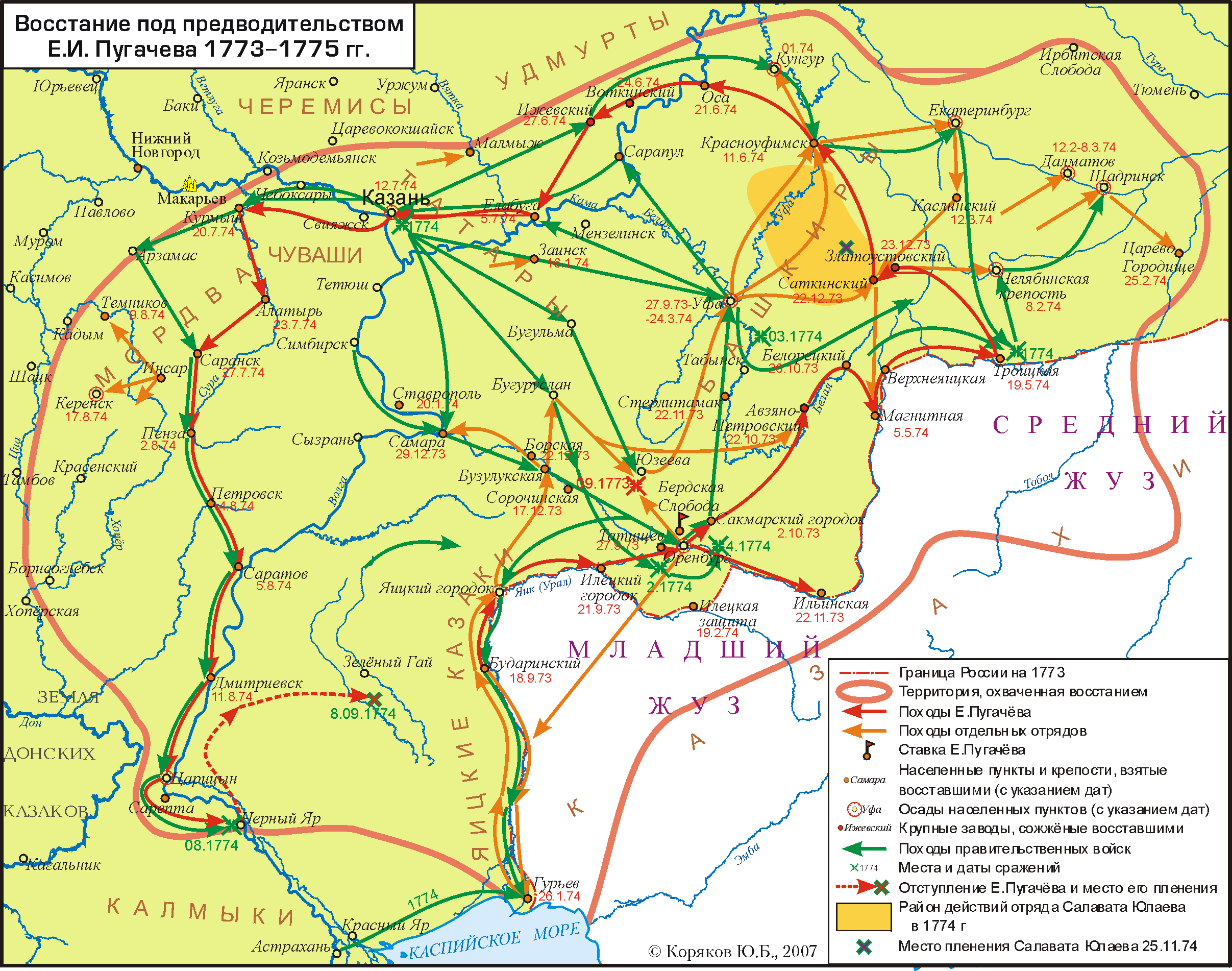
Pugachev's Rebellion
Pugachev's Rebellion (Russian: Восстание Пугачёва, romanized: Vosstaniye Pugachyova; also called the Peasants' War 1773–1775 or Cossack Rebellion) of 1773–1775 was the principal revolt in a series of popular rebellions that took place in the Russian Empire after Catherine II seized power in 1762. It began as an organized insurrection of Yaik Cossacks headed by Yemelyan Pugachev, a disaffected ex-lieutenant of the Imperial Russian Army, against a background of profound peasant unrest and war with the Ottoman Empire. After initial success, Pugachev assumed leadership of an alternative government in the name of the late Tsar Peter III and proclaimed an end to serfdom. This organized leadership presented a challenge to the imperial administration of Catherine II.
The rebellion managed to consolidate support from various groups including the peasants, the Cossacks, and Old Believers priesthood. At one point, its administration claimed control over most of the territory between the Volga River and the Urals. One of the most significant events of the insurrection was the Battle of Kazan in July 1774.
Government forces failed to respond effectively to the insurrection at first, partly due to logistical difficulties and a failure to appreciate its scale. However, the revolt was crushed towards the end of 1774 by General Michelsohn at Tsaritsyn. Pugachev was captured soon after and executed in Moscow in January 1775. Further reprisals against rebel areas were carried out by General Peter Panin.
The events have generated many stories in legend and literature, most notably Pushkin's historical novel The Captain's Daughter (1836). It was the largest peasant revolt in the history of the Russian Empire.
Background and aims[edit]
As the Russian monarchy contributed to the degradation of the serfs, peasant anger ran high. Peter the Great ceded entire villages to favored nobles, while Catherine the Great confirmed the authority of the nobles over the serfs in return for the nobles' political cooperation. The unrest intensified as the 18th century wore on, with more than fifty peasant revolts occurring between 1762 and 1769. These culminated in Pugachev's Rebellion, when, between 1773 and 1775, Yemelyan Pugachev rallied the peasants and Cossacks and promised the serfs land of their own and freedom from their lords.
There were various pressures on Russian serfs during the 18th century, which induced them to follow Pugachev. The peasantry in Russia were no longer bound to the land, but tied to their owner. The connecting links that had existed between the peasant community and the tsar, which had been diminishing, was broken by the interposition of the serf owners; these private lords or agents of the Church or state who owned the land blocked serfs' access to the political authority. Many nobles returned to their estates after 1762 and imposed harsher rules on their peasants. The relationship between peasant and ruler was cut off most dramatically in the decree of 1767, which completely prohibited direct petitions to the empress from the peasantry. The peasants were also subject to an increase in indirect taxes due to the increase in the state's requirements. In addition, a strong inflationary trend resulted in higher prices on all goods.[4] The peasants felt abandoned by the "modern" state.[5] They were living in desperate circumstances and had no way to change their situation, having lost all possibilities for political redress.
There were natural disasters in Russia during the 18th century, which also added strain on the peasants. Frequent recurrence of crop failures, plagues and epidemics created economic and social instability. The most dramatic was the 1771 epidemic in Moscow, which brought to the surface all the unconscious and unfocused fears and panics of the populace.[6]
Each ruler altered the position of the Church, which created more pressure. Peter the Great gave the Church new obligations, while its administration assimilated to a department of the secular state. The Church's resources, or the means of collection, could not meet the new obligations and as a consequence, they heavily exploited and poorly administered their serfs. The unrest spurred constant revolt among Church serfs.[6]